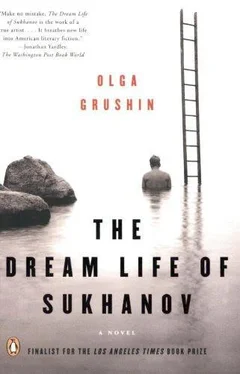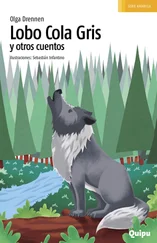I switched on the light.
That year, I was fascinated by trains. I painted the in-between chaos of railroad stations, stained by the palpable sorrow of partings and the sad waste of vagrant destinies, yet occasionally pierced by the dazzling ray of a joyous meeting, a pure emotion; the mechanical rhythm of robotic multitudes swallowed and regurgitated ceaselessly by metallic monsters, with a rare living, feeling person swept screamingly along within the faceless mass; foreign, at times hauntingly lovely landscapes seen only fleetingly, through a dirty windowpane, over a pathetic repast of vobla laid out on a newspaper editorial; random lives thrown together for one moment, squashed against each other in the dim, narrow confines of a crammed car, sharing space and time, mingling their breaths in a parody of human closeness, yet each of them remaining tragically, eternally alone…. Nina Malinina silently looked at the canvases propped against the walls and piled on the floor; and when she finally spoke, there was a note of surprise in her voice.
“Dark,” she said slowly. “Most of these are very dark, not at all what I expected. I love this one. Strange but… so beautiful.”
She pointed to a small painting of railroad tracks being repaired in the deep blue glimmer of moonlight by a brigade of melancholy, overweight angels with shining orange wings. And then, before I could stop her, she stepped across to my easel and in one swift movement lifted the blanket I had thrown over my latest work.
With this canvas, more challenging in composition, I had hoped to complete the railroad series and begin exploring another subject that had interested me of late, that of reflections—of houses in pools of rainwater, of shaving men in bathroom mirrors, of wives in their husbands’ glasses, of constellations in cups of tea. The painting depicted a crowd of people in browns and grays standing hunched over in the aisle of a train car, all of them seen from the back. The sturdy, well-dressed man in the foreground was reflected faintly in a window. His face, hovering over a dark patch of a forest, was middle-aged and vaguely unpleasant, with a hint of a double chin, and eyes, small and furtive like insects, hidden behind metal-rimmed glasses—the face of someone who had led a comfortable, predictable, inconsequential life. At this instant, however, his bland reflected features wore an expression of shocked recognition, as if he had just glimpsed a missed dream of his youth and for one heartbeat realized the meaningless-ness of his whole existence; and his eyes stared at the silvery wisp of another, less distinct, reflection—the specter of a strikingly beautiful girl who seemed to be flitting through the air behind him but was probably simply walking along the aisle, just outside the imaginary frame, briefly positioned precisely where a viewer of the painting would be standing. The girl’s face had been the most difficult thing to paint, and I had spent almost a month battling with its complexities: it had to look both real and ethereal at the same time.
“But,” said Nina Malinina haltingly, “but… that’s me.”
My voice louder than necessary, I started talking about generalized, classical features, instances of accidental similarity, the artist’s subconscious use of familiar material… And then something strange happened: she began to cry. Unlike most weeping girls, she did not invite a comforting gesture; her face looked angry, and her tears were silent and spare.
Unsettled, I turned away, waiting for her to compose herself.
“I understand,” she said quietly after a minute, “he really isn’t a very good painter. I must be going now.”
Our eyes met, and I had a sudden feeling that she disliked me greatly. I was surprised when she agreed to let me walk her home. She lived with her father on Gorky Street, a quarter of an hour away. When we parted, she wrote down her phone number on the back of one of my drawings.
The next day, I had a talk with Lev I felt guilty about my encounter with Nina, and I did not want him to hear about it from her. I altered the truth ever so slightly: I told him that when I had come to invite him along, his door had been closed, and hearing the sounds of an animated discussion inside, I had decided against interrupting. He gave me an odd look, then shrugged.
“Stop sounding so damn apologetic,” he said. “I don’t own her or her time.”
“But I thought you were… Aren’t you and Nina…”
“You thought wrong,” he said curtly. “We are friends. Old friends. We went to school together. The first time we talked, we were fourteen. She brought a sandwich with caviar for lunch, while I had a piece of bread spread with butter and sprinkled with sugar—the only thing my mother could afford. She was so fascinated she asked me for a trade. Good luck with her, Tolya. Now, about this last piece of yours, I’ve been thinking it over, and I’m not sure the composition works. Wouldn’t it be better if—”
I felt relieved at having Lev’s blessing, and dizzy with possibilities. After that, I saw her often. She had numerous admirers, of course, many of them in the highest ranks of society, where she moved freely because of her father, and I had no hope of impressing her with my mildly successful position in life or my unremarkable material accomplishments. Neither had I that sleek suavity acquired through experience with women, for in spite of being twenty-eight, I could brag of nothing but three or four passing flirtations in the whole of my past. But as I soon discovered, she loved art—loved it with a passion surprising in someone of Malinin’s flesh and blood. Not being blessed with talent (as she herself readily admitted), she had studied art history at the Moscow State University and was now working as a curator at the Tretyakovskaya Gallery. Soon a visit to this or that museum, a walk through this or that exhibition became our habitual way of spending time together, and as I would treat her to a fiery discourse on the nature of Fra Angelico’s colors or van Gogh’s brushstroke, I would feel encouraged by the look of reluctant admiration I imagined at times in her wonderful mermaid eyes.
One evening in late May, I took her to the Bolshoi Moskvoretsky Bridge, to show her the garlands of liquid lights carried away by the river and tell her about a painting I had envisioned, with a mysterious city of golden churches and lacelike towers gleaming mistily under the still, dark waters of a lake, its quivering contours too incandescent to be a reality, too enchanting to be a reflection, too palpable to be a dream. And then I looked up and saw her standing there, in her narrow-waisted white dress, absently picking tiny blossoms off a branch of deep purple lilacs I had brought her and watching their twirling descent into the current below—and I could wait no longer. I told her I loved her, had loved her since the first time I saw her. She was quiet for a moment, then said expressionlessly that it was growing chilly, and could I please walk her home; but something in her face made my heart flutter like a mad butterny—and a few weeks later, she kissed me.
It was the first real day of summer, bright and green and hot, and we went for a walk in Gorky Park. Lev came too, with Alia, a giggling nineteen-year-old with an upturned nose and eyes blue and empty as glass, whom he claimed to have met a week before in an ice cream line. The four of us rented a boat, but it proved too small to hold everyone at once, and Lev and I took turns rowing the girls around the lake; and when, distracted by the glittering waves and the sun flashing into my eyes and Nina’s summery, lighthearted presence, I crashed the boat into the low branches of a willow tree, Nina began to laugh, and Lev and Alia waved and shouted from the shore, and as I tried to extricate us from the wavering, sparkling, leafy ambush, she suddenly leaned over—and kissed me.
Читать дальше








![Theresa Cheung - The Dream Dictionary from A to Z [Revised edition] - The Ultimate A–Z to Interpret the Secrets of Your Dreams](/books/692092/theresa-cheung-the-dream-dictionary-from-a-to-z-r-thumb.webp)



